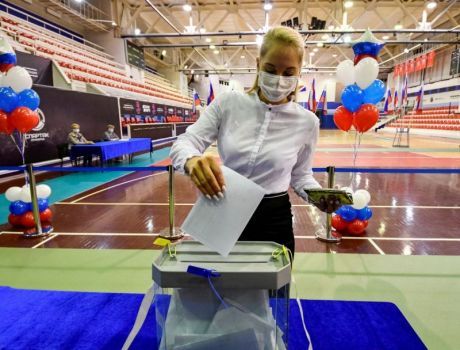Reports
You are here
Putin's referendum: Report from Russian socialists

July 16, 2020
A letter from “Socialist Tendency”, a group based in the Russian city of Nizhny Novgorod, near Moscow, about the recent constitutional vote in the Russian Federation.
Since the beginning of 2020, the Russian ruling class has been promoting conservative amendments to the existing constitution: the consolidation of marriage as “the union of a man and a woman” and embedding the concept of God. But the biggest actual change the authorities prepared for us was to the presidential term to allow Vladimir Putin to rule the country until 2036.
The vote was supposed to take place on April 22, but due to the pandemic it was postponed until July 1. On July 3, the Central Election Commission announced the final results of the vote: 77.92% in favour with a turnout of 67.97%. Now the authorities can and will declare that a majority of the population support the constitutional changes and that these changes are legitimate.
But let’s see if this is actually the case.
1. A large number of voters took part not of their own free will, but because the regime used peoples’ economic dependence to force them to appear at polling stations.
2. The ruling class deployed huge resources to campaign for the amendments, to spread propaganda and mobilize their supporters. Banners were hung in the streets, material was sent to mailboxes, on public transport, on residential buildings, along roads, on radio and television, everywhere people were told that the changes would benefit the country.
3. The voting procedure was not transparent: there was opportunity to throw in ballots while “disinfecting the premises from the coronavirus,” and during the mass “voting from home.” And there was also the impossibility of having independent observers in the polling stations for the 7 days during which the vote took place. In addition to recorded stuffing of ballot boxes, there were cases of voter identity fraud.
4. Local officials demanded that state employees and employees of large businesses send an account of their participation.
5. In the Moscow and Nizhny Novgorod region electronic voting also took place, and full information was on servers owned by the state, which made any kind of control over the results impossible.
According to some Russian statistical experts who have studied this and past votes, it is possible to say with confidence that fraud was massive: up to 22 million ballots could have been thrown in.
The mass scale of ballot stuffing is confirmed by the results of independent exit polls indicating that 54.89% voted against the amendments in Moscow, and 63.07% voted against in Petersburg.
There has been manipulation and fraud, to one extent or another, in all Russian elections and votes. Oppositionists learned for a long time to catch out the authorities’ lies, but this time it was especially deliberate, and the vote itself organized in a way that made it physically impossible to track all the violations.
In addition to a high result for show, the ruling class of an authoritarian regime needed a high turnout to claim there had been a democratic process. A high turnout also speaks to the regime’s ability to control behaviour and ensure political mobilization in its own interests.
Society in Russia is split roughly equally between those who support the president’s existing course and those who oppose Putin with conviction. Amongst opponents of the regime there was no uniform opinion about how to resist the course of the authorities: by participating and voting “against” or by boycotting the process. But despite this none believe the official results and discontent continues to grow.
Many left organiziations (Socialist Tendency, the Union of Marxists, Marxist Tendency, etc) chose the tactic of an active boycott of the vote, because a mass boycott would have shown the population’s distrust of the current government and its institutions.
This tactic, also supported by many non-left associations, may have been fruitful: in nine regions of the country the voter turnout was less than 50%, which speaks to reluctance by the majority to participate in such a charade – and possibly with an understanding that a mere vote under a criminal dictatorship of oligarchs could not resolve the situation.
What will amendments to the Russian constitution of 1993 bring us? What can ordinary citizens and left forces in the country expect from this? Almost all the changes introduced were already de-facto in effect before being adopted - as spelled out in the relevant codes, laws and regulatory acts. The only new element is the elimination of the presidential term. The acting president of the country has provided himself an extension of power for a minimum of one more mandate. But given the possibility of fraud by the bureaucratic apparatus, this means possibly up to three maximum presidential terms. Most likely, this makes Putin president for life.
It is completely possible to assume that even without these amendments Putin would not have left the leadership, but would have occupied other existing high-placed posts or a position would have been specially created for him. But such a long rule by an existing president is profitable to the capitalist ruling class in so far as it serves to “cement” them and prevents the elite from splitting.
Despite the formal defeat, socialist forces gained an invaluable experience in carrying out a campaign. Unfortunately, this time unity was not possible. Socialists were divided roughly in half: between the supporters of “against” and supporters of a boycott. However, there was some rallying together inside each of the camps, which in future can lead to more decisive action and to a stronger result.
Socialist Tendency, Nizhny Novgorod, Russian Federation
https://m.vk.com/@socialtendency-ist-korotko-o-klassovom-delenii-obschestva
Section:
Topics:









